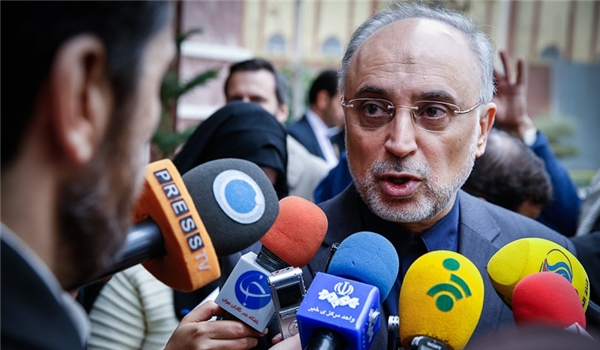Head of the Atomic Energy Organization of Iran (AEOI) Ali Akbar Salehi voiced pleasure in the progressive nature of the nuclear talks between Iran and the six major world powers
 Head of the Atomic Energy Organization of Iran (AEOI) Ali Akbar Salehi voiced pleasure in the progressive nature of the nuclear talks between Iran and the six major world powers and said Tehran continues its efforts to work out a win-win solution to its nuclear standoff with the western powers.
Head of the Atomic Energy Organization of Iran (AEOI) Ali Akbar Salehi voiced pleasure in the progressive nature of the nuclear talks between Iran and the six major world powers and said Tehran continues its efforts to work out a win-win solution to its nuclear standoff with the western powers.
Salehi told reporters in Tehran on Wednesday that the negotiations have, so far, been "good" and "progressive", adding that the Iranian negotiating team would make every effort to reach a win-win result.
Asked whether he will be present in the new round of talks due to start in Lausanne, Switzerland, on Wednesday night or Thursday, the AEOI chief said that he would also travel to Switzerland to take part in the meetings.
Also Foreign Minister Mohammad Javad Zarif said today that he and other members of the Iranian negotiating team would do their best in the new round of the talks to bring the opposite side into terms.
Asked how much determined the Iranian negotiating team is to implement the guidelines of Supreme Leader Ayatollah Ali Khamenei who had stressed the lifting of all sanctions, Zarif said this is what the government has insisted on from the very beginning.
The Iranian nuclear negotiators will leave Tehran for Lausanne, Switzerland, Wednesday for the next round of nuclear talks with the world powers.
Zarif is to meet with his US counterpart John Kerry in Lausanne on Thursday.
The ninth round of talks between the Iranian and US nuclear negotiators was held in Lausanne on Friday afternoon in the presence of Zarif, Kerry, their deputies, Salehi, US Energy Secretary Ernest Moniz, and EU foreign policy chief Federica Mogherini and her deputy Helga Schmid. The Iranian negotiators returned to Tehran on Saturday to participate in ceremonies celebrating the Iranian new year (which started on March 21).
Zarif said on Saturday that Tehran and the 5+1 group of powers had found technical and political solutions to their differences.
"Proper technical and political solutions have been found for the issues which couldn't be solved in the past," Zarif wrote on his Facebook page.
"We were ready for negotiations, but the other side needed more time for coordination," he added.
"We have decided to return to Geneva on Wednesday to continue the talks, and God willingly, finalize the details of the solutions," Zarif said.
Earlier, Iranian Deputy Foreign Minister Sayyed Abbas Araqchi Araqchi said that the next round of nuclear negotiations with the world powers would start on Wednesday, March 25.
The US and European countries needed more consultations and arrangements with their governments to continue talks with Iran, he said.
Talks between Iran and G5+1 were very serious and extensive, he said, adding that nuclear teams at this juncture are in need of more negotiations and coordination, Araqchi added.
Owing to the same reason, foreign ministers of the European states and the US met in Berlin on Saturday to get ready for the new round of the negotiations today.
Iran and the G5+1 are negotiating to narrow their differences over Tehran's nuclear energy program ahead of a July 1 deadline.
Zarif underlined on Friday that the ball was in Washington's court to make a choice between a final deal or ineffective pressures against Tehran.
"Iranians have already made their choice: Engage with dignity," Zarif wrote in her tweeter page.
"It's high time for the US and its allies to chose: pressure or agreement," he added.
Last week, Salehi announced that Tehran and Washington had overcome their differences on technical issues with regard to Iran's nuclear program in most of the cases, adding that both sides were trying to resolve the remaining technical problems.
"We have agreed on 90 percent of technical issues," Salehi said after his second meeting with US Secretary of Energy Ernest Moniz in Lausanne, Switzerland, in mid March.
"There has only remained one very important point of difference that we will try to resolve in the evening talks," he added.
Both Iran and the G5+1 negotiators have underlined that cutting a final deal before the July 10 deadline is possible.
In relevant remarks earlier this month, Zarif said there was still a good chance for the success of the nuclear talks between Tehran and the world powers, but meantime underlined that failure of the negotiations would never mean the end of world to Iran.
"There is still an over 50-percent chance for the attainment of an agreement and I feel that both sides believe that success and attainment of an agreement will be much better and useful than failure in the negotiations; yet, failure in reaching an understanding will not be the end of the world but both sides have spent their time and political prestige in the success of these talks," Zarif said in an interview.
He stressed that the chances for the failure of the talks would be alive as long as agreement was not attained on all issues and details, and said, "As it was said in the Geneva agreement (November 2013), as long as an agreement is not made on all issues, nothing has been agreed on."
Asked about the removal of the sanctions against Iran, Zarif said, "Removal of the UN Security Council sanctions aren’t complicated and merely depends on the political will (of the other side)."